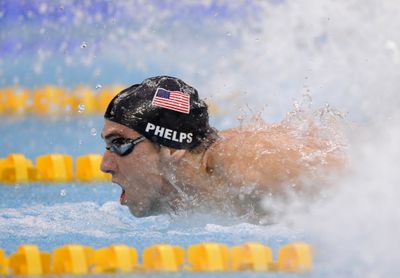Phelps, Beijing forever linked
What will 2012 bring?

BEIJING – As teammate Jason Lezak stroked for home, Michael Phelps looked up at the bubbled ceiling of the Water Cube. His smile seemed to stretch from one end of the pool to the other.
After nine days of immersion, Phelps was ready to dry off.
With Lezak’s winning touch in the 4x100-meter medley relay, in the world record time of 3 minutes, 29.34 seconds, Phelps achieved his goal of capturing eight gold medals in one Olympic Games. He had eclipsed a storied record, Mark Spitz’s seven golds of 1972. He had dominated his sport like no other athlete. Nine days, 17 races, seven world records, eight golds.
Incredible numbers, breathtaking numbers, surreal numbers, but no longer impossible numbers. Five years ago, when Phelps first plotted his record, it seemed like a presumptuous, wacky fantasy. He was like a baseball player declaring he would break Joe DiMaggio’s 56-game hitting streak. He was like an astronaut declaring he would step foot on Mars.
Once in a while we need someone who doesn’t ask why, but why not?
With single-minded dedication, Phelps took on history.
Today, Phelps sprung from the starting block in third place, but by the turn of his butterfly leg he had regained the lead for the U.S. Lezak lengthened it.
At the end, not only were Phelps’ arms and legs tired, so was his neck. Eight times Phelps stepped to the top of the podium to have a gold medal draped over his head.
Certain athletes are linked forever as the signature stars of their Games: Jesse Owens in Berlin, Bob Beamon in Mexico City, Nadia Comaneci in Montreal, Carl Lewis in Los Angeles. Beijing belongs to Phelps.
He’ll probably celebrate with a couple of pizzas and a pile of pancakes. The U.S. has fallen in love with Phelps not only because he is a winner, but because he is exactly what you see: an unpretentious 23-year-old young man who likes to eat, sleep, play video games and race. Son of a Maryland state trooper and a Baltimore teacher, he’s still the hyperactive little brother who found his second home at the pool.
He’s not trying to be a renaissance man, just a renaissance swimmer, shredding the record book of his sport. After the Olympics, swimming leaves prime time and returns to its regularly scheduled 2:30 a.m. PDT time slot, but with a higher worldwide profile. Phelps vowed he would transform his sport. He did it, becoming a millionaire in the process.
When he’s doing his laps, staring at the black line on the bottom of the pool that stretches to infinity, he’s not writing a novel or solving algebra problems. He is focusing on the force of his kick, the lift of his arms, the position of his head.
His coach, Bob Bowman, plays Mozart sonatas and manages a stable of thoroughbreds in his spare time. But when he chats with his protégé, it’s about the Baltimore Ravens and Washington Nationals.
“Michael is not into political issues,” Bowman joked. “He’s more likely to say, ‘Oh, is this an election year?’ ”
Phelps does one thing better than just about anybody else has done one thing.
He’s not a tortured soul. He’s an artist, but he’s no Van Gogh. His medium is water. He has a feel for the water as a potter does for clay.
Phelps, savant of the stopwatch, hits even his splits with uncanny precision.
In Beijing, Phelps won every kind of way. He won by cruising, winning the 400 individual medley by a body length. He won by the narrowest of margins, swooping to the wall with his final stroke in the 100-meter butterfly to out-touch Milorad Cavic by one one-hundredth of a second.
He won when his goggles leaked. He won when Lezak saved the streak by streaking through the final leg of the 4x100 relay.
With 14 career golds, he’s surpassed four other Olympians who had held the record with nine.
Incredible numbers, breathtaking numbers, surreal numbers, but no longer impossible numbers.
Phelps will be back for more in 2012. Nine golds in London? Why not?